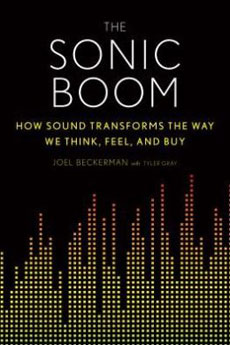"What happens when you hear the tinkly music of the ice cream truck? Does it make you think of the heat of summer? The chill of a creamy sweet treat or faux-fruit refreshment on your tongue? Or maybe it takes you back to a childhood in the suburbs, and you feel a twinge of anxiety from hearing that faint music, which meant begging your mom or dad for change and sprinting out the door before the truck rolled by. Sound initiates all those feelings and memories of sights, temperatures, and tastes.
"Think about what happens when you walk into a Starbucks. Even before the coffee aroma grabs you, it's likely that you hear the hiss of the milk steamer or the bang of the espresso portafilter being dumped for the next batch. There's also the distinctive music that Starbucks plays and sells in their stores. Your brain is fitting all those sounds into patterns you know — sonic memories and expectations — and combining them with the sights and smells to create a multisensory reaction. But the sound does the work without your realizing it. If you had to consciously consider all of this stuff, you'd be exhausted by the time you hit your desk at nine o'clock, whether or not you'd downed a venti latte.
"Music in particular helps an experience become a memory and later helps you recall those memories with just a few of the right notes. Ever wonder why you struggled to learn the names of all the U.S. presidents but can sing the entire process of how a bill becomes a law? ('I'm just a bill . . .')
"Why is it that you probably can't name the capitals of all fifty states but you can recite a significant portion of the Oscar Mayer wiener song?
"Try to recite the alphabet without hearing the music — or at least the el-em-en-oh-pee cadence — of the ABC song.
"In my musical, professional, and personal life, I often ask people questions like these to demonstrate all the instances where sound and music drives our reactions. This ear-opening exercise affects new converts — whether they are friends, family, acquaintances, collaborators, or clients — the same way almost every time. Once they know the basic ideas, they start to hear the world in a brand-new way. Something powerfully unconscious becomes powerfully conscious. They're aware of a world of sounds around them that they never paid attention to before. They hear things they never heard. They make connections. And when they come back to tell me about it, they are always wide-eyed and smiling. 'I hear this everywhere now!' They suddenly realize that the reason they always feel so irritable in the grocery store is the horrible music being piped through the speakers, and they understand why they feel that sharp pang of excitement when the ping of the phone announces a new message.
"Why would all these smart people not be aware of the powerful role of sound already? Because it's so pervasive, they scarcely notice it. Sound is present every moment of our lives, affecting our moods, our reactions, our thoughts, and our choices on a largely subconscious level."
